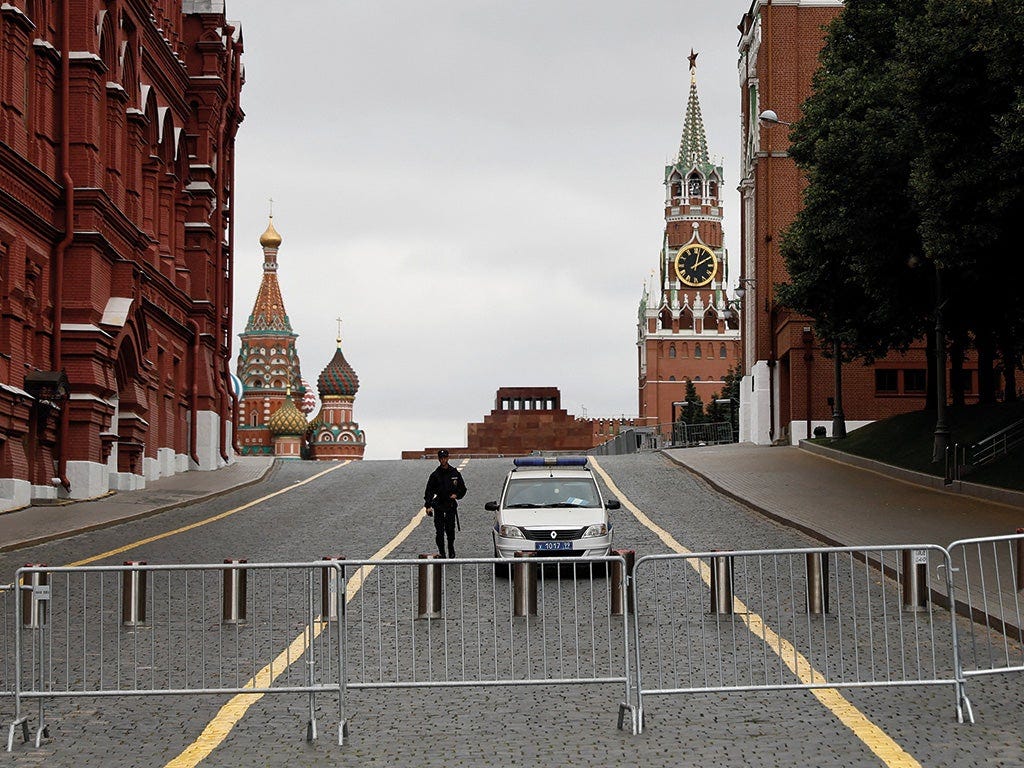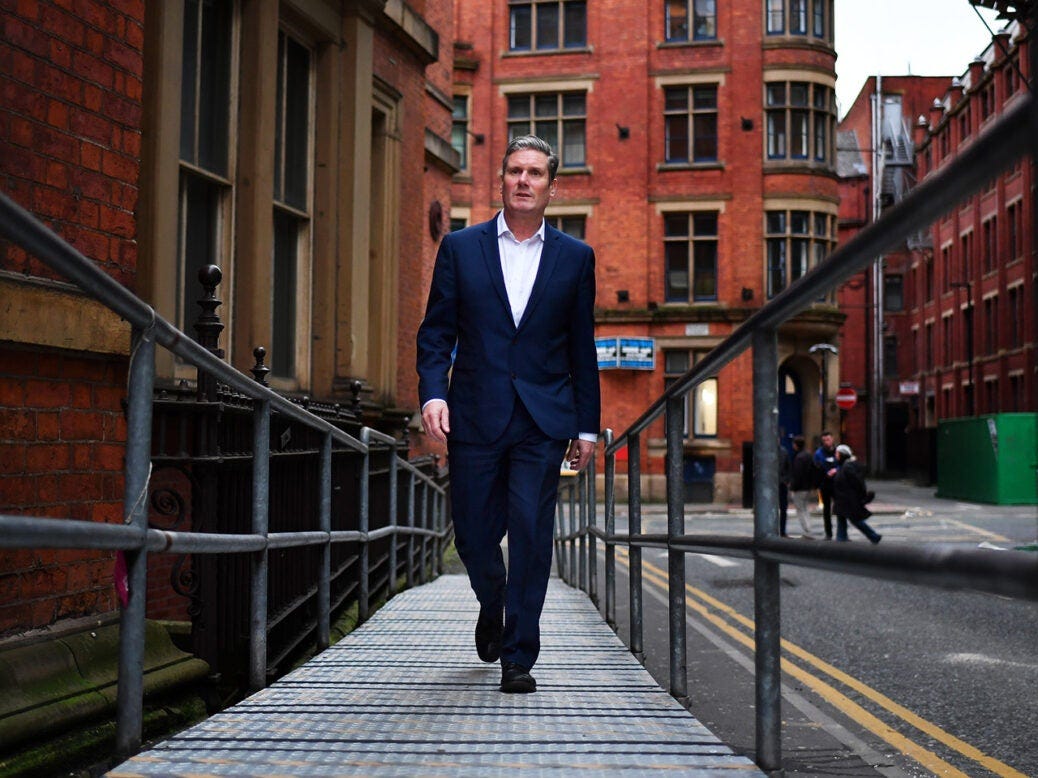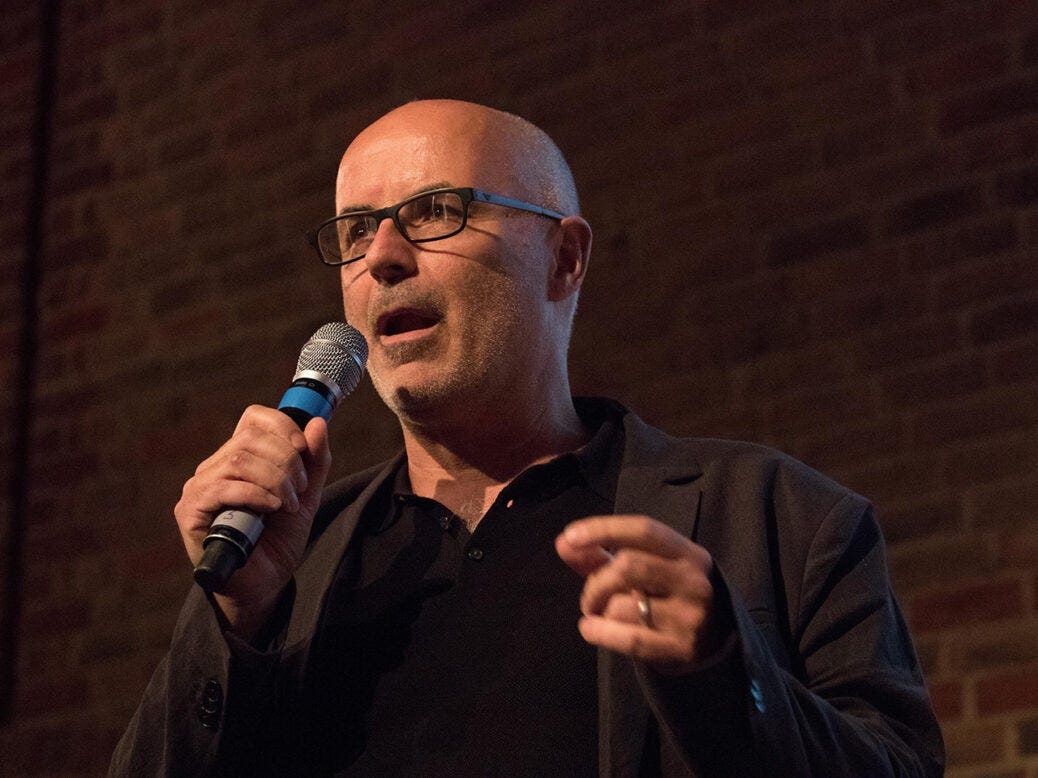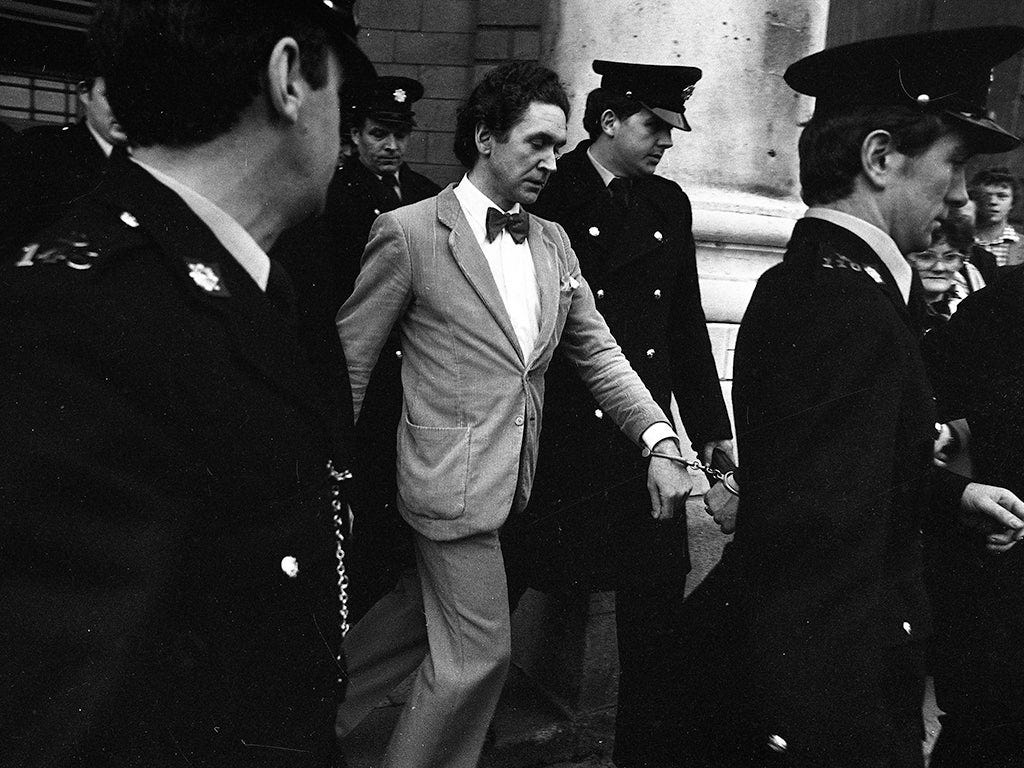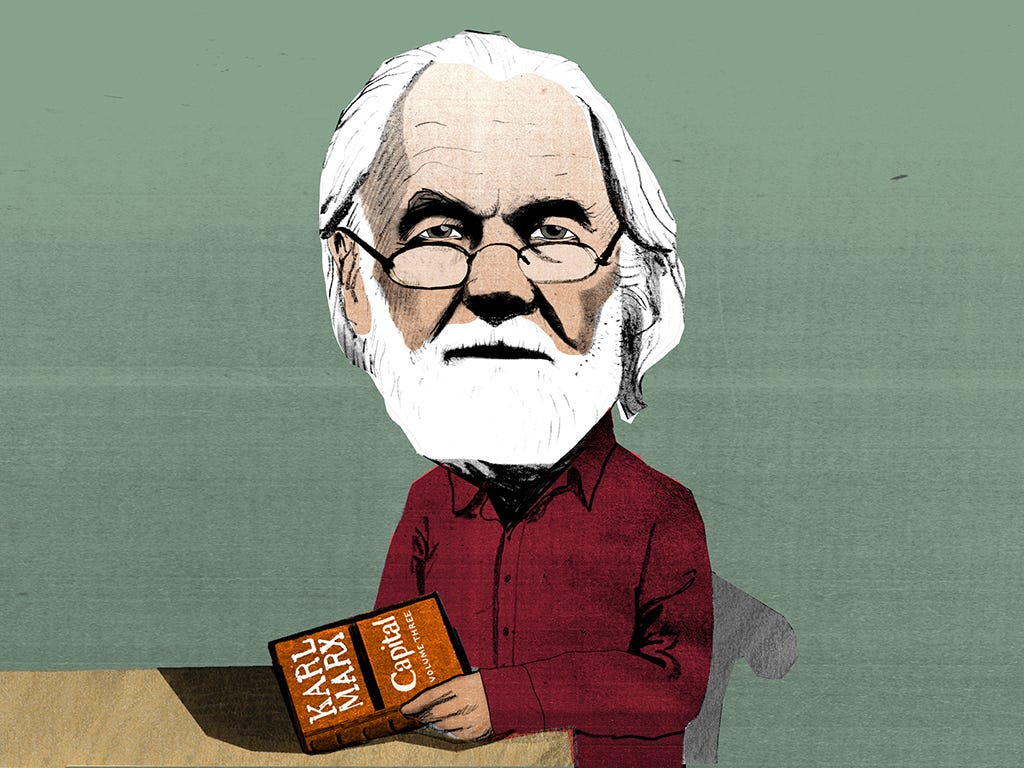The Saturday Read: This weekend's 10 picks
Inside: Prigozhin, RFK Jr, Marx, class, the fight against time, Starmer the authoritarian.
Good morning, and welcome to the Saturday Read, the New Statesman’s weekly guide to the best writing on ideas, politics, books and culture. This is Will, along with Harry.
NB: If this email doesn’t load for you in full, you can view it online (or in app) by clicking on the button you see when your email cuts off. The email hasn’t ended until you reach the sign-off, which Harry has written today.
If the pieces below intrigue, perhaps you’d like to try a trial subscription to the NS. Read three free articles after registering on our site. A digital subscription is just 95p a week. If you are already a subscriber, thank you for reading us. Let’s get to it.
1—“Prigozhin got most of what he wanted.”
What happened in Russia in the past week? Bruno Maçães, our foreign affairs correspondent, takes us through events day by day.
Imagine that an armed group in Texas or Yunnan launched a march on Washington or Beijing, announcing everything in advance on social media in messages laced with prison slang and threats to destroy everything in their way. Imagine further that the group quickly advances to the environs of the capital, while the central army authorities scramble to destroy motorways as a last resort to stop the marauders. On its way, the group shoots down a few helicopters and aeroplanes. Finally, as it approaches the seat of power, Washington or Beijing are forced to sign an armistice.
2—“The device, the size of a small fridge, would cost $160,000 new, but Zolman knows a guy.”
Sophie has written another one of those interviews you simply won’t regret reading.
Zolman rose to prominence when he was named as the doctor to Bryan Johnson, the 45-year-old American tech entrepreneur who recently made headlines for injecting himself with his 17-year-old son’s plasma in an experimental bid to reduce his biological age. Johnson speaks to Zolman for an hour a day and spends £1.6m a year on a team of doctors and other experts who devise his extreme longevity programme, dubbed “Project Blueprint”.
Johnson has created a 37-minute video of his typical morning routine that might be inspirational or might be one of the most poignant studies of loneliness you’ll ever see. It shows the tech tycoon padding around his house buff and shirtless, knocking back handfuls of pills (he takes around 80 a day), drinking tablespoons of olive oil hunched over the sink, powering through a bowl of pureed vegetables the colour and consistency of pond weed, and solemnly crunching his abs in front of a rainforest mural in an empty gym.
3—“America has changed more than I had realised in recent decades – mostly for the worse.”
That, writes Ann Manov in our Books lead this week, is what dawned on her reading Jean Twenge’s new data-laden book, Generations. Come for Ann’s drive-by of columnising and the past decade in digital media, stay for the many facts and ruminations that follow.
Some of the book’s statements are familiar: that individualism became more important in the post-1968 era; that 12 per cent of college students in 1950 but 80 per cent in 1990 agreed with the statement “I am an important person” (this is the most well-known statistic from Robert Putnam’s Bowling Alone, published in 2000). For all her love of data, Twenge can make blanket, spurious assertions that are more nostalgic than edifying.
4—“A spectre is haunting Keir Starmer – the spectre of François Hollande.”
David Klemperer explains why the Labour leader needs to look over the Channel to understand the biggest challenges he faces, should Starmer triumph at the next general election.
Much as Labour members might wish to avoid the comparison, Hollande is a politician to whom Starmer bears more than a passing resemblance. A middle-aged Socialist Party bureaucrat, Hollande was a bland personality from the centre of his party, lacking both a clear ideological profile and experience of ministerial office. Although he stood on a platform that, like Starmer’s today, included bold economic reforms and plans for active industrial policy, he campaigned primarily as an unthreatening, consensual moderate – a reassuringly boring safe pair of hands.
In contrast to Nicolas Sarkozy, the hyperactive and scandal-ridden right-wing incumbent, Hollande promised to govern as a “normal” president. (Starmer has played up a similar contrast with Boris Johnson.) Amid the eurozone crisis and pressure on the cost of living, Hollande succeeded in accomplishing what Starmer hopes to achieve at the next election – taking advantage of the incumbent’s unpopularity to end a long period of conservative rule.
5—“He’s no raging Trotskyite, embittered Corbynista or wailing extremist.”
Will pluralism in Labour survive Keir Starmer’s leadership? Freddie speaks to the latest victim of the Labour leadership’s purge of dissenting voices: Neal Lawson, the head of the party’s Compass pressure group, and a former member of its establishment.
He has little confidence that the party will exonerate him, and if the accusation is upheld he would be automatically expelled. “The rules are so arbitrary,” he said. “And these people act with such impunity that you don’t know what they’re going to do, and that is the practice of the bully: to act in an arbitrary way… so everyone’s completely on their toes all the time.” Lawson thinks this authoritarian approach represents a failure of imagination within the leadership, a symptom of its insecurity. “In the absence of a deep intellectual cultural project it seems like there’s a bureaucratic project,” he said. “And so, therefore, [they are] focusing on control over ideas and vision.”
Freddie is the lead writer of Morning Call, our daily political newsletter. Sign up:
6—“Kennedy seemed to be obsessively re-enacting the violent trauma that had fractured his own youth.”
Robert F Kennedy Jr is fast becoming a political phenomenon. His favourability ratings are higher than Joe Biden’s and Donald Trump’s. The New York Times describes the anti-vax campaigner as a “headache” for the president. Nick Burns examines an American monomaniac:
Many others in RFK Jr’s generation – the “Boomers” – came to idolise their own childhoods in retrospect (memories of the vanished good humour of the Fordist era), while developing a muddled relationship with authority, visible in politics as in their personal lives. The instinct to reform the country’s institutions and return them to their supposed principles contended with the unshakeable desire to rebel against or escape the system. Manifestations of the counterculture of the Sixties and Seventies reflected one or the other urge – and both stuck. They can be seen duelling in Kennedy’s recent writing, which combines encomia to “FDR/JFK liberalism” with gleeful invective against US officialdom.
7—“Toynbee may well have been the first woman – though certainly not the last – to be disgusted by Boris Johnson.”
Why does Polly Toynbee, perhaps the most prominent social democrat in Britain’s media, sound like a melancholy conservative philosopher? Read her surprisingly good memoir to find out, explains Will.
Toynbee is brutally knowing about herself, about the left in Britain, and the air of absurdity that descends on wealthy people who try to improve the lives of the poor. There are several majestic moments of bitter realism in these pages, where she sounds as astrally pessimistic as the most melancholic conservative philosopher: “Human life changes so much less than each generation imagines… How little changes, how little society progresses.” The only time I felt she was lying – or being slightly blithe – came near the end of the book: “I have never had a day in my life when I haven’t felt cocooned in safety.” After reading about the other Toynbees, a cast of drunks, crackpots, philanderers and sad cases, I was amazed that Polly Toynbee was so sane.
8—“What the hell is going on over there? I can’t get Deborah to return a f***ing phone call!”
Can Deborah Turness fix BBC News? The division’s prized assets – the Today programme on Radio 4, and Newsnight on BBC Two – are losing audience and relevance. Turness, who is coming up on a year as the division’s chief executive, has spoken to William Turvill, our media correspondent, about her plans for change.
Will gives us a good sense of who Turness is, where she has come from, and why some journalists think the BBC “signed Messi” when they poached her last year from ITN.
When I asked Bill Rogers, a former BBC staffer who now runs a broadcast news blog, whether he thought it was possible for Turness to deliver such “radical” change at the BBC, he said: “I’m not convinced. You wouldn’t ever say BBC News was enormously fast-moving. I don’t know what she’s doing that’s different. I don’t get it.”
9—“O’Connell’s previous books are about people haunted by the future. The new book is haunted by the past.”
Mark O’Connell, an Irish journalist, has written a book about a murderer, Malcolm Macarthur – convicted of killing two people in 1982 – in the lineage of Janet Malcolm’s famous The Journalist and the Murderer (1990). Lola Seaton examines its similarities and “postmodern” distinctions.
It was after one of these sightings that O’Connell had what he calls “a realisation: that I was going to write about Macarthur”. This elision of intention – a dawning rather than a decision – seems to echo the mysterious hardening of Macarthur’s resolve to kill, as though there is something murderous about writing about another person. The book opens with O’Connell’s atmospherically analogue efforts to hunt Macarthur down (loitering around Macarthur’s haunts, consulting a phone book). Eventually O’Connell approaches him in the street and convinces him to talk. Although the book goes on to recount Macarthur’s childhood and to reconstruct the murders, the book is as much about the complexities of telling the story of a life as it is about Macarthur himself.
10—“There’s a revolutionary subject to be found today in the delivery driver, in the barista.”
Owen Hatherley profiles David Harvey, academic, adviser to revolutionary governments and city planners, as well as the leading interpreter of Karl Marx alive today.
David Harvey is now in his late eighties. He has a dedicated YouTube channel, where his course on Marx’s Capital has more than a million views. He has advised states, co-directing the Ecuadorian Rafael Correa government’s National Strategy Centre for the Right to the Territory (Cenedet) in the 2010s, and advising the centre-left Roh Moo-hyun government on the planning of Sejong, a planned capital city in South Korea.
This fame is all the more peculiar given that Harvey has never been a fashionable figure. He is a genial presence – Jeremy Corbyn-like, with white beard and jumper, in his fireside chat-like “Anti-Capitalist Chronicles” on YouTube – but does not tell off-colour jokes, or indeed any jokes. He does not probe the deeper mysteries of the value form. He has maintained a curious distance from “theory”. Since the early 1970s Harvey has been a straight-up revolutionary socialist, his eye focused on the class war and the apparently endless transformations of capital.
Lloyds Banking Group is calling for 1 million new, genuinely affordable homes to be built by 2033.
A safe home is the foundation on which people can build a decent life. That’s why, together with Crisis, we’re calling for one million new genuinely affordable homes to be built and made available to those on the lowest incomes, with a focus on supporting people at risk of, and experiencing homelessness. Find out more.
Will’s Best of the Rest
Politico: Starmer’s “real politics” revealed, says aide. He’s not a hippie.
Sun: Sunak calls protestor-wrestling Bairstow a hero. Sadly Sunak is not quite as manly.
Marina Hyde: Lord Lebedev just wants to be a public servant! How to write a column without getting sued 101.
Zoe Hu: Miami and the siege of Mar-a-Lago.
Slavoj Žižek: The populists must be crushed. Is he… a liberal now?!
Tara Isabella Burton: How to escape cultural pessimism.
Caitlin Flanagan: The Harry and Meg podcasts we will never hear.
Look how happy this chimp is. Just the happiest little guy.
“TikTok battalion” seeks to replace Wagner in Ukraine. More good news for Kyiv.
Elsewhere on the NS
“Faced with a seemingly insoluble dilemma – admit that Prigozhin had him hemmed in, or risk turning him into a martyr – Putin froze.” Katie Stallard also reviewed this week in Russia, turning to a number of analysts.
Wes Streeting, the Labour shadow secretary of state for health, spent the day with Dr Phil Whitaker, at our medical editor’s Somerset practice. Anoosh was there to report.
James Graham – writes Jason, our editor-in-chief – takes contemporary political events and recasts them as state-of-the-nation dramas. His latest is Dear England, a portrait of Gareth Southgate and England’s national football team that is, by turns, didactic, sententious, vital, witty and formally daring.
“Had the great illusionist MC Escher designed a building, it would be the National Portrait Gallery.” Michael Prodger, our art critic, returns to the renovated NPG. I need to go myself.
Kara Kennedy had never been to a casino before. So of course she went to the largest one she could find in Miami, and discovered room after room of flip-flop-wearing rain men.
In the week in which Branson’s Virgin Galactic launched its first commercial space flight, Esther Watson considers the mind of a true egotist. “Branson is a man of contradictions. A man who was so excited at a Clinton Foundation fundraising event he pledged to donate $3bn to fight climate change (his net worth at the time was… $3bn).”
Alex Hochuli writes on the Musk-Zuck cage fight, which is no less than a window into our neo-feudal moment. Whoever wins, he argues, we – the de facto peasantry – will lose.
“The Labour leadership,” writes Maurice Glasman, “which yearns for the UK to return to the EU, struggles to understand the changes that have gone on within its lost homeland”.
Tanjil Rashid reviews Tomiwa Owolade’s This is Not America, a book “that may well endure beyond the moment it addresses”.
And with that…
In August 2010, a tribal British politician gave one of the best speeches of the modern era. He was reacting to a speech made ten days earlier that he described as “wrong in its analysis of the past; reckless in its diagnosis of the current situation; and dangerous in its prescription for the future”. The coalition’s plans for austerity were “deeply unfair”, he said. They were also “unnecessary, unsafe for our economy and unsafe for our public services too”.
That politician was Ed Balls. The speech he was reacting against had been made by George Osborne. It was a pivotal moment. Balls, a formidable economic mind and Gordon Brown’s former lead adviser at the Treasury, was framing the politics of the coming decade. His speech now looks prophetic (as it seemed to the NS then; George described it as “the most sustained and forensic attack on the coalition’s economic policy we’ve yet seen” at the time). For the next five years Balls fought against Osborne’s ideologies in parliament from across the despatch box.
This week, it was announced Balls would be starting a podcast with Osborne. What was it all for? Did Balls’ opposition to austerity mean anything? Almost no one is beyond the pale, but is there a greater culprit for the ills of the past decade than Osborne?
Thank you for reading. Don’t miss out – subscribe to the New Statesman and stay up to date with everything you need: from news and analysis to comment and criticism.
Whether you’re looking for a sharp blog or a finely written feature, the New Statesman has you covered. Have a good week, and catch you next Saturday.
Thanks to our colleague Chris Bourn.









